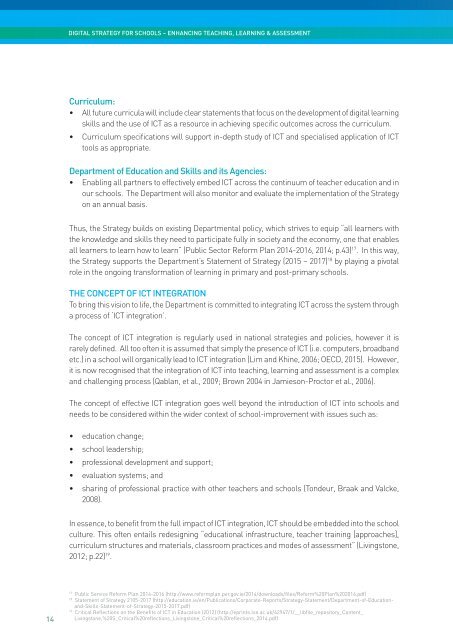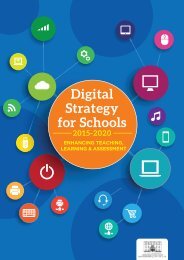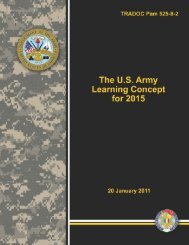Digital Strategy for Schools
TKmef
TKmef
You also want an ePaper? Increase the reach of your titles
YUMPU automatically turns print PDFs into web optimized ePapers that Google loves.
DIGITAL STRATEGY FOR SCHOOLS – ENHANCING TEACHING, LEARNING & ASSESSMENT<br />
Curriculum:<br />
• All future curricula will include clear statements that focus on the development of digital learning<br />
skills and the use of ICT as a resource in achieving specific outcomes across the curriculum.<br />
• Curriculum specifications will support in-depth study of ICT and specialised application of ICT<br />
tools as appropriate.<br />
Department of Education and Skills and its Agencies:<br />
• Enabling all partners to effectively embed ICT across the continuum of teacher education and in<br />
our schools. The Department will also monitor and evaluate the implementation of the <strong>Strategy</strong><br />
on an annual basis.<br />
Thus, the <strong>Strategy</strong> builds on existing Departmental policy, which strives to equip “all learners with<br />
the knowledge and skills they need to participate fully in society and the economy, one that enables<br />
all learners to learn how to learn” (Public Sector Re<strong>for</strong>m Plan 2014-2016, 2014; p.43) 17 . In this way,<br />
the <strong>Strategy</strong> supports the Department’s Statement of <strong>Strategy</strong> (2015 – 2017) 18 by playing a pivotal<br />
role in the ongoing trans<strong>for</strong>mation of learning in primary and post-primary schools.<br />
THE CONCEPT OF ICT INTEGRATION<br />
To bring this vision to life, the Department is committed to integrating ICT across the system through<br />
a process of ‘ICT integration’.<br />
The concept of ICT integration is regularly used in national strategies and policies, however it is<br />
rarely defined. All too often it is assumed that simply the presence of ICT (i.e. computers, broadband<br />
etc.) in a school will organically lead to ICT integration (Lim and Khine, 2006; OECD, 2015). However,<br />
it is now recognised that the integration of ICT into teaching, learning and assessment is a complex<br />
and challenging process (Qablan, et al., 2009; Brown 2004 in Jamieson-Proctor et al., 2006).<br />
The concept of effective ICT integration goes well beyond the introduction of ICT into schools and<br />
needs to be considered within the wider context of school-improvement with issues such as:<br />
• education change;<br />
• school leadership;<br />
• professional development and support;<br />
• evaluation systems; and<br />
• sharing of professional practice with other teachers and schools (Tondeur, Braak and Valcke,<br />
2008).<br />
In essence, to benefit from the full impact of ICT integration, ICT should be embedded into the school<br />
culture. This often entails redesigning “educational infrastructure, teacher training [approaches],<br />
curriculum structures and materials, classroom practices and modes of assessment” (Livingstone,<br />
2012; p.22) 19 .<br />
14<br />
17<br />
Public Service Re<strong>for</strong>m Plan 2014-2016 (http://www.re<strong>for</strong>mplan.per.gov.ie/2014/downloads/files/Re<strong>for</strong>m%20Plan%202014.pdf)<br />
18<br />
Statement of <strong>Strategy</strong> 2105-2017 (http://education.ie/en/Publications/Corporate-Reports/<strong>Strategy</strong>-Statement/Department-of-Educationand-Skills-Statement-of-<strong>Strategy</strong>-2015-2017.pdf)<br />
19<br />
Critical Reflections on the Benefits of ICT in Education (2012) (http://eprints.lse.ac.uk/42947/1/__libfile_repository_Content_<br />
Livingstone,%20S_Critical%20reflections_Livingstone_Critical%20reflections_2014.pdf)




